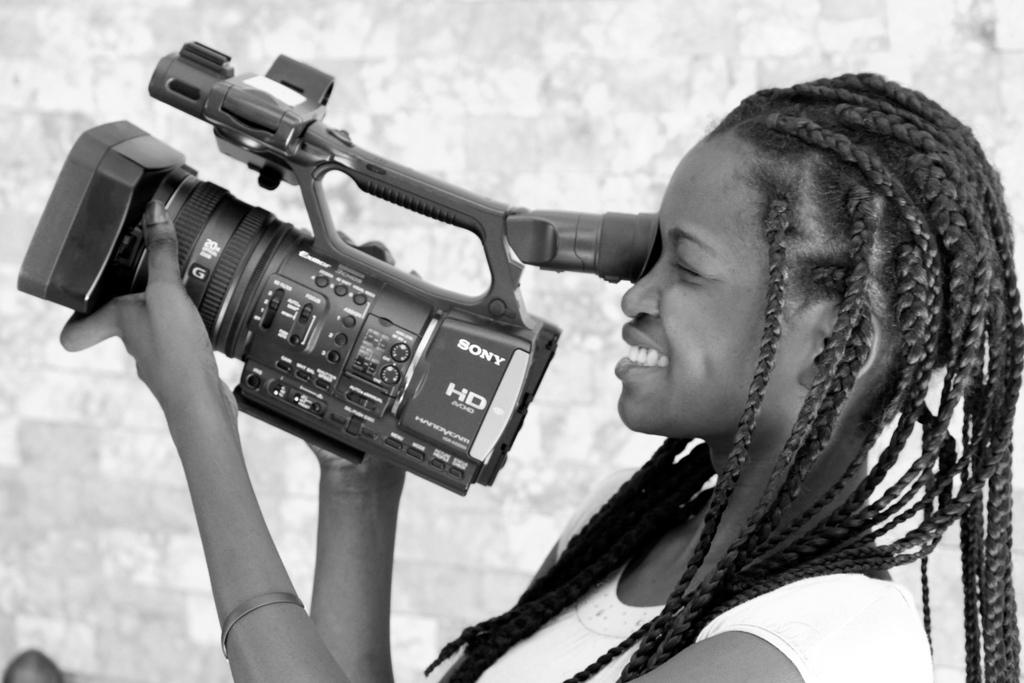Efforts underway to educate young reporters in Haiti
A student shoots video as a part of Haiti Reporters, an initiative to help young journalists learn and get hands-on experience documenting the lives of Haitians.
PORT-AU-PRINCE, Haiti — If the cornerstone of democracy is a free press, then the structural integrity of Haiti’s foundation is in serious trouble.
The crumbling of the cornerstone of journalism has been under way for a long time, according to a half dozen journalists and activists in many corners of civil society whom I’ve had a chance to meet with on this trip.
It is the result of fissures caused by fierce partisan politics, as well as decades of a menacing hostility by successive governments to truth. The cracks have created a climate of fear and timidity with notable exceptions, such as the courageous radio journalist Liliane Pierre Paul and others who do their best. The brave souls who dare to get too close to the truth can end up in exile or dead, as has happened throughout Haiti’s history.
That said, the earthquake also contributed to the further erosion of the structure. The infrastructure at many news organizations was decimated by the destruction. Reporters, editors and their news organizations are left as shocked and traumatized and struggling to get by as any other sector of society in post-quake Haiti.
HATT4: Un camp abandonné á Delmas 31 from Haiti Reporters on Vimeo.
To help with the recovery and shore up the cornerstone, there are a few efforts underway here to train reporters. One project is headed up by two American journalists with long connections to Haiti, Kathie Klarreich and Jane Regan. They have cobbled together grants to establish the Fund for Investigative Journalism in Haiti and offer a workshop in investigative reporting. The reporters working with them are producing strong work.
Another program is a documentary film school called ‘Haiti Reporters.’ It was founded by Dutch journalist and documentary producer Anton Vriens through a family foundation, and with support from several other European donors.
The school is run out of an elegant old, stucco home in a neighborhood in the capital where many of the houses around it were visibly damaged by the quake. You can see the rubble and the collapsed beams of homes that will take years to repair, if indeed they ever can be repaired.
But here, a group of 17 bright, young faces were crowded into a small classroom, listening to a lesson on how to work as a freelancer and how to be “an entrepreneur in journalism” which was being given by Carl Henri, a business reporter for the leading newspaper Le Nouvelliste.
After the lecture, several of the student reporters were working on producing a video using basic Final Cut software on a laptop. Another was quietly typing up notes from an interview. There was a sense of purpose to the place that was inspiring.
Jacob Kushner is an instructor at Haiti Reporters and a GlobalPost correspondent. He and I have been building a team of American and Haitian journalists who can work together on our GlobalPost ‘Special Report’ titled “Fault Line: Aid, politics and blame in post-quake Haiti,” which is probing how billions of dollars of aid money is being spent. Several of the top, young Haitian graduates of this training program will be working with us on the ‘Special Report,’ and we will keep you posted on our progress.
Our coverage reaches millions each week, but only a small fraction of listeners contribute to sustain our program. We still need 224 more people to donate $100 or $10/monthly to unlock our $67,000 match. Will you help us get there today?
